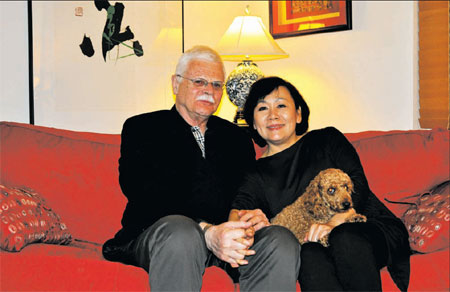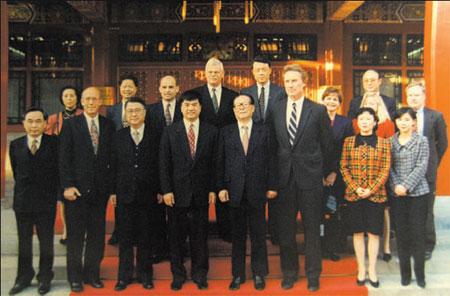The 'gateway' connector
Updated: 2013-02-15 14:04
By Chang Jun (China Daily)
|
||||||||
|
Joe Borich and his wife Ting Hsiao-hui at their home outside Seattle. Borich, who helped set up the US consulate general in Shanghai in 1980 and since then has promoted cooperation between the US and China, says he's an "incurable optimist" about trade and economic cooperation between the two countries. Deng Yu / China Daily |
|
Joe Borich (top-row, center) was with a Washington State delegation headed by Gary Locke (front-row, fourth from left), then governor of the state and now the US ambassador to China, in 1997. The then-Chinese President Jiang Zemin (front-row, fourth from right) met the delegation in Beijing. Provided to China Daily |

Joe Borich leads the Washington State China Relationship Council, America's oldest trade association dealing specifically with the Asian country, China Daily's Chang Jun reports.
Joe Borich might have difficulty recalling how many times he has been to China, but says memories of his first trip are everlasting.
"That was in 1979, I was picked by the first US council general to Shanghai to open up the office there and stayed on in the economic section," Borich recalled.
The difference between China in the 1970s and now is "mind-boggling," said Borich, the current president of the Washington State China Relationship Council (WSCRC), which was created in 1979 to promote stronger commercial, educational, and cultural relations between the state of Washington and China.
"The first trip provided a baseline," Borich said during an interview with China Daily in his spacious office in downtown Seattle, where many Chinese-made souvenirs and gifts are on display, including silk embroidery, paintings and replicas of terracotta warriors. "I compare where China is today to that of almost 40 years ago, so the changes are much more impressive to me," he said.
The year 1979 was also a milestone in US-China relations.
"China and the US finally normalized the bilateral diplomatic relationship," said Borich, who helped set up the US consulate general in Shanghai from scratch.
That same year, the then Chinese Vice-Premier Deng Xiaoping visited the US, and included Seattle in his tour.
Mama huhu
More than three decades later, Borich is seen as a leading voice in the Bellevue-Seattle area and throughout Washington State, partly because of his extensive time in China and hands-on experience with China-related topics.
Prior to leading the WSCRC, Borich served in the US Foreign Service for 25 years, approximately 12 of which were in Greater China, including as the US council ceneral to Shanghai from 1994 to 1997.
"I spent one entire year studying Mandarin in the 1980s," Borich recalled, musing that his spoken Chinese is mama huhu (so so).
In 1980s, US-China trade was still in its fledgling stage when Borich was with the US council general in Shanghai. He spent the majority of his time traveling extensively to the surrounding areas of Shanghai. "I made lot of good friends and I will call up meetings with them when I am in Shanghai," said Borich.
In 1997, when Borich finished his tenure as the council general and returned to the US, he received a call from the then-president of WSCRC, asking if he would be interested in presiding over the council.
"I thought it would be a perfect way to bundle my experiences and roll them over into the private sector," said Borich. He accepted the offer and relocated his family to Seattle from the East Coast.
As the oldest non-governmental statewide trade association in the US dealing specifically with China, WSCRC strives to bridge China and US business communities and help the two sides communicate, Borich explained.
The council represents more than 100 companies, and provides trade support and information to major companies in Washington such as the Boeing Co, Microsoft Corp and Costco Wholesale, as well as to the ports of Seattle and Tacoma.
The organization has a mix of big companies that have long-standing direct business relations with China, and small companies that do business with China or want to enter the Chinese market, explained Borich.
"Part of that (the council's) role is being sensitive to those do's and don'ts in China so when our members make their business plans, they have broader knowledge of business in China," said Borich.
"We offer support for our university and corporate member companies who wish to invest and expand. We talk with them about what they want to do in China, how to get started, and how to establish themselves in China."
Borich and his organization frequently reach out to their member companies by organizing trade delegations to China, hosting visiting Chinese counterparts and sponsoring seminars to spread knowledge about doing cross-border business in China and the US.
Vibrant Bilateral Trade
As one of the major export hubs in the US, Washington State exports nearly $65 billion worth of goods and commodities annually. Often dubbed the "gateway state," Washington's geographic proximity to the Asian Pacific, easy access to ports, airports and railways and long history of marine business all have helped attract international businesses, including those from China.
The Seattle and Tacoma ports are closer to Asia than other West Coast ports by a day's shipping distance, according to Andrew Cassey, an economist at Washington State University.
China is Washington's largest export market. In 2011, Washington exported $11.2 billion in merchandise and commodities, an 8.7 percent increase over 2010, according to the Washington Economic Development Commission.
Since 2006, China has been Washington's largest market for aerospace products. In 2011, sales to China in this field were nearly $4 billion, accounting for 55 percent of the state's exports.
Boeing, the state's largest exporting company, has projected that in the next 20 years China will need 5,000 new commercial airplanes. "You do the numbers - it equals to a $600 billion transaction in total," said Borich, which would make China Boeing's largest commercial-airplane customer.
China also has been Washington's largest market for ultrasound equipment since 2007. In 2011, sales reached a record $128.4 million, a 21.6 percent increase over 2010, according to Spencer Cohen, senior policy adviser of the Washington Economic Development Commission.
Cohen said the exports consist of agriculture products from Washington State: Crisp apples, cherries, wine and candies, like Almond Roca, and Starbucks coffee to satisfy the taste buds of China's emerging middle class of 300 million.
China will remain the focal point of Starbucks' international expansion efforts, John Culver, president of Starbucks China and Asia Pacific, said last year. He said that Starbucks believes its China operations will be its second largest outside of the US by 2014. Starbucks is confident that it will have more than 1,500 stores across China by 2015, he said.
"They (Chinese) like the more sophisticated wine produced in Washington State," Borich noted.
Washington State also aggressively imports from China. Merchandise ranges from traditional electronic equipment, textiles, apparel and shoes, to higher-end products such as parts for commercial airplanes.
"We also buy iPhones," Borich added.
Borich is optimistic about the bilateral trade and business relationship between Washington State and China, saying that the current dynamic trend will increase. "Call me an incurable optimist, but my optimism is well-founded," he said.
Borich said several major Chinese companies have joined the council and have set up offices in Seattle.
They include Hainan Airlines, one of China's four leading air carriers, which operates four weekly flights between Seattle and Beijing. ISoftStone, a leading supplier for Redmond, Washington-based Microsoft, entered the city in 2011, creating about 200 local jobs and is still expanding.
"We are grateful to the Chinese investors. They invest, create jobs and stay," said Borich. "We also are starting to see a lot of Chinese investment heading our way, and we need to be prepared for that because there's huge potential."
City of Hospitality
Seattle is the only US city that all three generations of China's top leaders have visited, said Borich. "In this regard, Seattle is unbeatable".
The first visit was made by Deng Xiaoping in early 1979, during which he impressed American audiences with "easy spontaneity, identification with market reform and pitchy comments," according to a story published in the New York Times.
In November 1993, the then-Chinese president, Jiang Zemin, attended the Informal APEC Leadership Conference held at Seattle's Blake Island.
The most recent trip was made by Chinese President Hu Jintao in April 2006, during which he toured Microsoft's Redmond headquarters and dined with Bill Gates at his lakeshore mansion.
Why do Chinese leaders like Seattle so much? Borich said Washington State is probably the most free-trade-friendly and China-friendly state in America.
Washington State was among the first states to cash in on China's reform and opening up. In 1980, just one year after Deng Xiaoping's US visit, Chinese national shipping giant COSCO started its business through the busy Seattle port.
Borich shrugged off any criticism about China being an economic threat to the US, saying that blaming China for stealing US jobs is unfair. "Some of the jobs disappear because of technology and company consolidation," he said.
"I don't see a threat of a successful China, but I do see a threat from a failed China. I have a driving hope that China will succeed, and that the US will play a role in helping them succeed," he added.
Borich said that Seattle Mayor Mike McGinn is considering sending an invitation to Party leader Xi Jinping to visit the city, and that he will help draft the letter.
"We will show him our hospitality, talk about the attractions of Seattle, and persuade him to let the legend roll," Borich said.
Contact the writer atjunechang@chinadailyusa.com

 In Photos: 7.0-magnitude quake hits Sichuan
In Photos: 7.0-magnitude quake hits Sichuan
 Li Na on Time cover, makes influential 100 list
Li Na on Time cover, makes influential 100 list
 FBI releases photos of 2 Boston bombings suspects
FBI releases photos of 2 Boston bombings suspects
 World's wackiest hairstyles
World's wackiest hairstyles
 Sandstorms strike Northwest China
Sandstorms strike Northwest China
 Never-seen photos of Madonna on display
Never-seen photos of Madonna on display
 H7N9 outbreak linked to waterfowl migration
H7N9 outbreak linked to waterfowl migration
 Dozens feared dead in Texas plant blast
Dozens feared dead in Texas plant blast
Most Viewed
Editor's Picks

|

|

|

|

|

|
Today's Top News
Live report: 7.0-magnitude quake hits Sichuan, heavy casualties feared
Boston suspect cornered on boat
Cross-talk artist helps to spread the word
'Green' awareness levels drop in Beijing
Palace Museum spruces up
First couple on Time's list of most influential
H7N9 flu transmission studied
Trading channels 'need to broaden'
US Weekly

|

|









